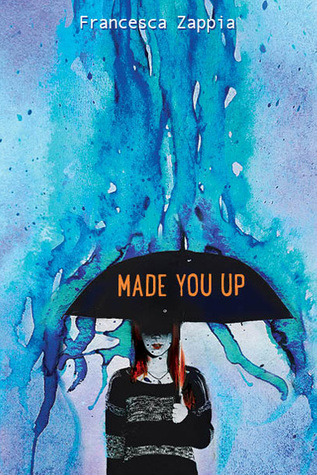
"Sometimes I think people take reality for granted."
The story centers around high school senior Alexandra Ridgemont (Alex, for short), who is schizophrenic and suffers from extreme paranoia.
We start with an incident that happened when she was seven: her mother brings her to the grocery store and leaves her in front of the lobster tanks. She spends some time staring at the lobsters, marvelling at the redness of their shells and comparing it to her own very red hair. Then, she meets a boy with the bluest of eyes, gets to know him a little, and together they set the whole tank of lobsters free. Her mother comes back, freaks out, and drags her away from the boy. The end.
Except that's not really what happened.
Lobsters aren't red unless they're boiled, and she hadn't set any of them free at all.
Alex classifies the whole incident as something she'd imagined. The adults around her classify the whole incident as Alex's first sign of schizophrenia.
But then, on the day before her first day at East Shoal, a boy comes to her work place. A boy with the bluest of eyes.
And suddenly, Alex isn't so sure she'd imagined the whole thing.
~.~
Here's the thing: Alex is an unreliable narrator.
We see things from her point of view, so many things she thinks are real are not, while many things she thinks are not real actually are. I cannot tell you how many times I had to think the events in the story over. Even now, I'm not sure what happened at certain points. Sometimes, you just have to accept that some things are not meant to be understood.
Alex struggles constantly with her schizophrenia - she can barely tell what she sees apart, she has to take pictures of so many things because she thinks seeing things through the photographs will help her see them as they really are, and she doesn't want anyone to find out about her schizophrenia because she knows everyone will stop believing what she says and start seeing her as a mental patient on the loose. It is much harder for her to get into college, something that her parents are constantly worried about. It is also much harder for her to interact with other people.
Whenever something was revealed to be part of Alex's hallucination, a part of Alex's world comes crashing down. The small things don't make such a big impact, but the larger things do. These parts are written off as stemming from her imagination, but the thing is that Alex has nothing else to replace these parts with, and they all leave something hollow in their place.
But the thing is, a big chunk of the story could have been a part of Alex's hallucinations, and it wouldn't matter at all. We have to empathise with Alex, understand her. Whatever is in the book is the truth to her, and we have to stop being concerned about the real truth to enjoy her story.
That's one thing I liked about this story.
I also found Alex very admirable, because she tried really hard. She tried to cope with her delusions, she tried to get through her final year so she could go on to college, she tried to help the people around her. She tried to take charge of her life, in spite of everything working against her. Not everyone can do that; not everyone tries. She did, and that made her a great protagonist to follow.
There's romance in this novel (not surprising, considering it is YA), and I have to say I rather liked it. It starts off with a mini prank war (because enemies to lovers is always the best) and slowly develops from there. It wasn't insta-love - at least, I don't think so. The characters revealed parts of themselves to each other slowly, got into fights, and eventually developed trust and came to an understanding. Honestly, it was kind of amazing. The guy, Miles, supported Alex, helping her constantly and believing her even when it was difficult to, and she supported him as he faced his own demons. They were each other's safe place and pillar of support; it isn't hard to believe they fell in love with each other.
Overall, I'm all for this book. It was pretty realistic, it didn't force the ending, and the romance wasn't pushed at the reader. Plus, it was really amusing at some parts. ("I wished I had put more cherries on that slice. The whole jar of cherries. I could watch him eat a whole jar of cherries. Jesus Christ on a pogo stick, what was happening to me?")
I'd recommend this book, especially if you would like to understand how certain people try to cope and live with mental illness. I wouldn't recommend it if you are one to get frustrated by doubt and confusion or bored with a general school setting.
If any of you pick it up, tell me what you think!
- Savant
No comments:
Post a Comment